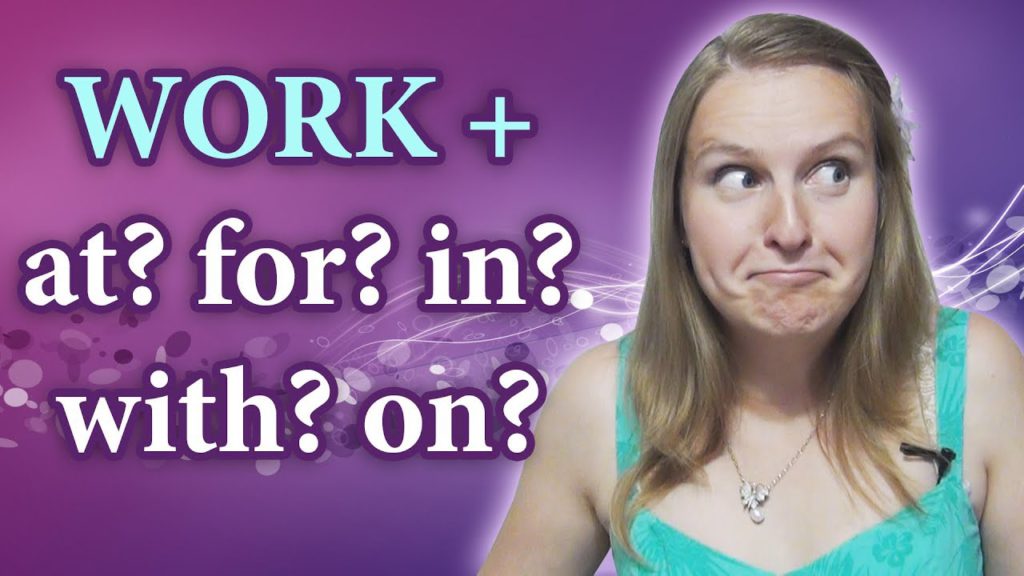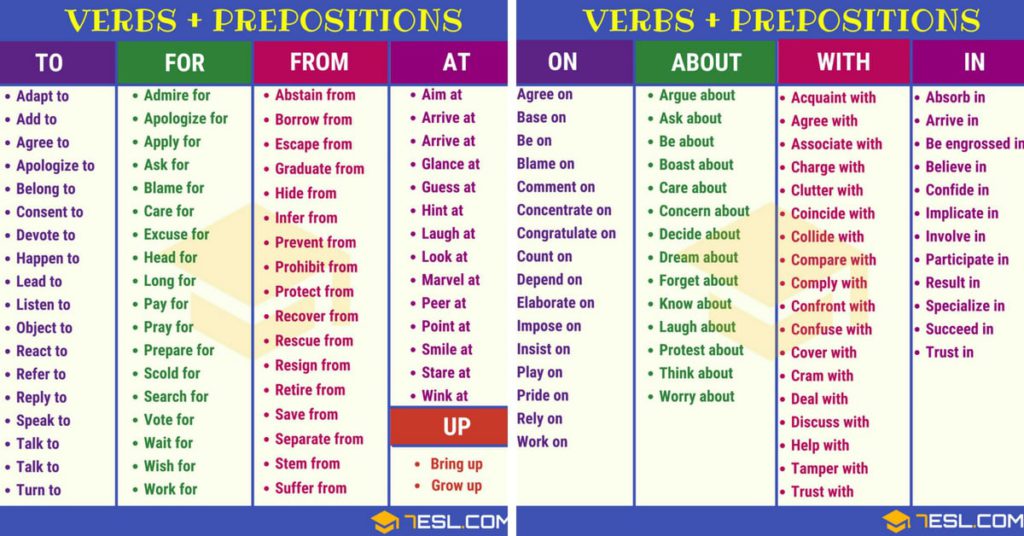
When a verb is part of a longer sentence, it is often followed by a specific preposition, before an object or another verb, and it is called a prepositional verb. The preposition is only grammatical, so it doesn’t change the meaning of the verb.
I agree with Mike.
She listens to the radio a lot.
He thanked me for the flowers.
Look at a few more:
- arrive at / in somewhere
We arrived at the airport.
We arrived in London. - belong to somebody
This book belongs to me. - borrow something from somebody
I borrowed a book from my classmate. - concentrate on something / doing something
I concentrated on studying at the weekend. - depend on something / somebody
It depends on the weather. - explain something to somebody
The teacher explained the exercise to the students. - listen to something / somebody
I listened to music. - pay somebody for something
I paid the waiter for the coffee. - wait for somebody / something
Wait for me! - worry about somebody / something
Don’t worry about a thing!
There are no grammatical rules to help you know which preposition is used with which verb, so it’s a good idea to try to learn them together. Here are some more:
Verb + for
They’re waiting for a bus.
He apologised for being late.
I applied for the job but I didn’t get it.
How do you ask for a coffee in Polish?
I can’t go out tonight because I have to prepare for my interview tomorrow.
Verb + from
This spray should protect you from mosquitoes.
Has he recovered from the accident yet?
She won an award because she saved someone from drowning.
I suffer from allergies.
Verb + in
She doesn’t believe in coincidences.
Our company specialises in computer software.
You have to work hard if you want to succeed in life.
Verb + of
I don’t approve of hunting animals for their fur.
Our dog died of old age.
This shampoo smells of bananas.
Verb + on
Their decision will depend on the test results.
The film is based on the novel by Boris Pasternak.
If you make so much noise, I can’t concentrate on my work.
Come on! We’re relying on you!
We don’t agree on anything but we’re still good friends.
Verb + to
Listen to me!
Can I introduce you to my grandfather?
Please refer to the notes at the end for more information.
Nobody responded to my complaint.
She apologised to me the next day.
Verb + with
I agree with everything you’ve said.
My assistant will provide you with more information if you need it.
We’re finding it difficult to deal with the stress.
Practice:
Write the correct preposition to complete the sentence. Choose from the following prepositions: for, from, in, of, on, to, with.
1. It smells ______ coconut in here.
2. Tax is based ______ how much you earn.
3. We promise to respond ______ all emails within three days.
4. I’m doing a law degree, specializing ______ commercial law.
5. Our staff will provide you ______ audio guides on request.
6. It took me two weeks to recover ______ the flu.
7. Shall I ask ______ the bill?
8. We succeeded ______ raising the money for the local animal shelter.
9. I find it hard to concentrate ______ anything when the television is on.
10. They apologized ______ hurting her feelings.
11. I never agree ______ my sister on politics.
12. She suffers ______ terrible headaches in hot weather.
13. I’m applying ______ internships this summer to get some work experience.
14. My mother didn’t approve ______ my friends when I was a teenager.
15. Do you believe ______ ghosts?
16. Kerem, let me introduce you ______ Professor Tsang.
Verb + other prepositions
Other prepositions can be used to create prepositional verbs. Some of these prepositions are against, into, and like. For example:
- We decided against visiting my aunt.
- The car nearly crashed into a tree.
- I feel like going on an adventure.
Verb + multiple prepositions
Certain verbs can take multiple prepositions without changing the overall meaning of the sentence. For example, the verb talk can use the prepositions to and with interchangeably:
- I need to talk to the principal.
- I need to talk with the principal.
On the other hand, some verbs’ meanings do change when a different preposition is introduced. For example, the verb dream can mean to aspire when it is used with the preposition of; however, when it is used with the prepositions about, it means to see images during sleep. For example:
- She dreams of becoming a pilot. (aspiration)
- She often dreams about flying. (image during sleep)
Comparing a prepositional verb to a phrasal verb
While the meaning of a phrasal verb is often different to the original meaning of the main verb, the meaning of a prepositional verb is usually the same as the main verb. Phrasal verbs also use adverbs as well as prepositions, whereas prepositional verbs do not.
For example, the meaning of the verb ask doesn’t change when combined with the preposition for; however, it changes dramatically when combined with the preposition out:
- Kelly asked for a raise. (The literal meaning of to ask is to inquire. Kelly inquired about a raise, making it a prepositional verb.)
- Kelly asked out Chad. (Ask out means to invite someone on a date, making it an idiomatic phrasal verb.)
Phrasal verbs are also often separated by nouns and pronouns. For example,
Put your jacket on.
Put it on.
Prepositional verbs cannot be separated. The two words must remain together.
Visit 120+ Useful Verb Preposition Combinations, for examples and pictures.

And listen to the video for pronunciation.
